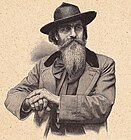
Back بوابة:لاسلطوية Arabic Tuveli:Arotieva AVK Portal:Anarxizm Azerbaijani Portal:Anarquisme Catalan Portal:Anarchismus German Portal:Anarquismo Spanish Portail:Anarchisme French Portal:Anarquismo Galician Portale:Anarchia Italian Портал:Анархизам Macedonian
Selected Anarchism-related content Anarchism is a political philosophy and movement that is against all forms of authority and seeks to abolish the institutions it claims maintain unnecessary coercion and hierarchy, typically including the state and capitalism. Anarchism advocates for the replacement of the state with stateless societies and voluntary free associations. A historically left-wing movement, anarchism is usually described as the libertarian wing of the socialist movement (libertarian socialism). Although traces of anarchist ideas are found all throughout history, modern anarchism emerged from the Enlightenment. During the latter half of the 19th and the first decades of the 20th century, the anarchist movement flourished in most parts of the world and had a significant role in workers' struggles for emancipation. Various anarchist schools of thought formed during this period. Anarchists have taken part in several revolutions, most notably in the Paris Commune, the Russian Civil War and the Spanish Civil War, whose end marked the end of the classical era of anarchism. In the last decades of the 20th and into the 21st century, the anarchist movement has been resurgent once more, growing in popularity and influence within anti-capitalist, anti-war and anti-globalisation movements. (Full article...)
Selected articleAlexander Berkman (November 21, 1870 – June 28, 1936) was an anarchist known for his political activism and writing. He was a leading member of the anarchist movement in the early 20th century. Berkman was born in Vilnius in the Russian Empire and emigrated to the United States in 1888. He lived in New York City, where he became involved in the anarchist movement. He was the lover and lifelong friend of anarchist Emma Goldman. In 1892, Berkman attempted to assassinate Henry Clay Frick as an act of propaganda of the deed. Though Frick survived the attempt on his life, Berkman served 14 years in prison. His experience in prison was the basis for his first book, Prison Memoirs of an Anarchist. After his release from prison, Berkman served as editor of Goldman's anarchist journal, Mother Earth, and he established his own journal, The Blast. In 1917, Berkman and Goldman were sentenced to two years in jail for conspiracy against the newly instated draft. After their release from prison, they were arrested—along with hundreds of others—and deported to Russia. Initially supportive of that country's Bolshevik revolution, Berkman quickly voiced his opposition to the Soviet use of violence and the repression of independent voices. In 1925, he published a book about his experiences, The Bolshevik Myth. While living in France, Berkman continued his work in support of the anarchist movement, producing the classic exposition of anarchist principles, Now and After: The ABC of Communist Anarchism. Suffering from ill health, Berkman committed suicide in 1936. (read more...)Selected image Portrait of Benoît Broutchoux, French anarcho-syndicalist. Broutchoux was active in the French trade union movement and was among the Parisian bohemians arguing for free love at the turn of the 20th century. Did you know?
Selected quoteAnniversaries for January 25
Relevant listsCategoriesRelated portalsParent portals Socio-political portals Related WikiProjectsParent projects
Economics · Philosophy Socio-political projects Anarchism TopicsThings you can doThank you for your interest in improving the coverage of anarchism on Wikipedia!
Related WikimediaThe following Wikimedia Foundation sister projects provide more on this subject:
Discover Wikipedia using portals |























